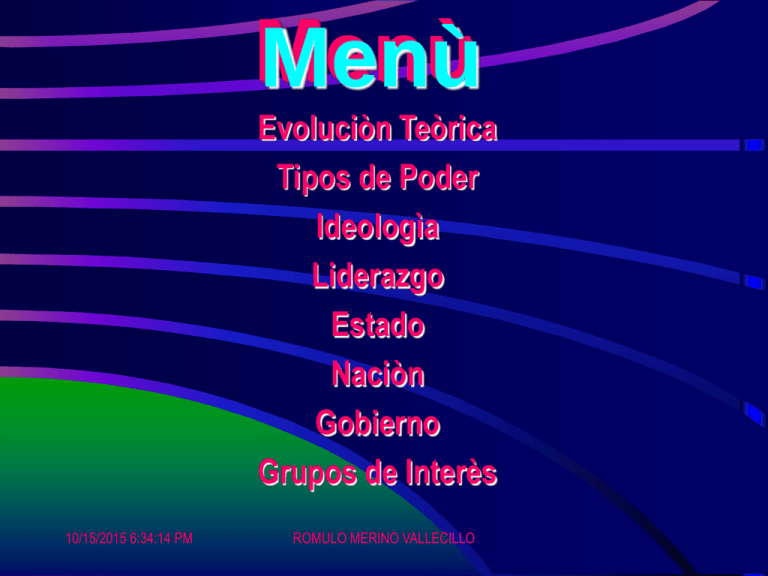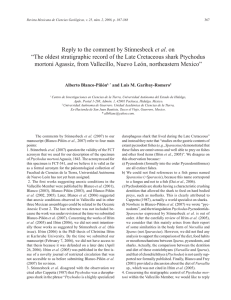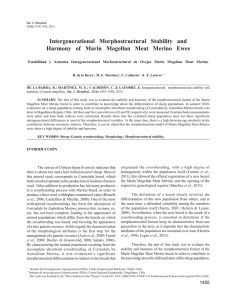Menù Evoluciòn Teòrica Tipos de Poder Ideologìa
Anuncio

Menù Evoluciòn Teòrica Tipos de Poder Ideologìa Liderazgo Estado Naciòn Gobierno Grupos de Interès 10/15/2015 6:34:14 PM ROMULO MERINO VALLECILLO 10/15/2015 6:34:14 PM ROMULO MERINO VALLECILLO Political Science Studies the power relations that appear in every human group or society BUT at a State level. This science analyze the distribution, consolidation and, consequences of the Political Power. 10/15/2015 6:34:14 PM ROMULO MERINO VALLECILLO POWER • Is the capacity to modify others actions. • Is a struggle between freedon and order. 10/15/2015 6:34:14 PM ROMULO MERINO VALLECILLO Theoretical Evolution Greece gave birth to this science, though at that time it was considere more as an art. At the very beginning the political behavior was close related to ethics. 10/15/2015 6:34:14 PM ROMULO MERINO VALLECILLO Theoretical Evolution Greeks created a very developed system of social organization based on the principle that all citizens were capable of self-governing. They governed themselves according to a social division and created the State-cities 10/15/2015 6:34:14 PM ROMULO MERINO VALLECILLO Theoretical Evolution During Middle Ages • power linked to the possession of and wealth • conflict between spiritual and secular power 10/15/2015 6:34:14 PM ROMULO MERINO VALLECILLO Theoretical Evolution Machiavelli Considered as the father of this Science because he liberated the political actions from any moral or ethical remorse He worked as an advisor and wrote his suggestions in the “Prince” 10/15/2015 6:34:14 PM ROMULO MERINO VALLECILLO Theoretical Evolution • The goal justifies the means to reach it • Is better to be feared than to be loved • The “dirty work” must be done by others • Beware of you friends and destroy you enemies 10/15/2015 6:34:14 PM ROMULO MERINO VALLECILLO Theoretical Evolution Jean Bodin gave the principles of sovereignty, understood as the Supreme Power. During the 16th centrury this power was in the King’s hands nowadays it stands on the citizens’ side. 10/15/2015 6:34:14 PM ROMULO MERINO VALLECILLO Theoretical Evolution With the concept of sovereignty appeared the conflict between: Government Government of vs of Men Laws Every authority must be submitted to the norms. 10/15/2015 6:34:14 PM ROMULO MERINO VALLECILLO Theoretical Evolution Motesquieu established in Spirit of the Laws the division of the political power to achieve an equilibrium. Legislative, Executive, Judicial This division only works when each one decides independently 10/15/2015 6:34:14 PM ROMULO MERINO VALLECILLO Theoretical Evolution Rousseau thought that the rights and duties of each member of the society had to established in a Social Contract. 10/15/2015 6:34:14 PM ROMULO MERINO VALLECILLO Types Power • Authority.- is impersonal, can be traditional or legal-rational. • Influence.- when power is executed in an indirect way. Persuade rather than force. • Resource control-. when power comes with the possession of something considered valuable. 10/15/2015 6:34:14 PM ROMULO MERINO VALLECILLO Distribution of Power Elite model Control by few persons because it is asumed that masses are aphatic and uninformed, so they do not participate. Linked to Oligarchy 10/15/2015 6:34:14 PM ROMULO MERINO VALLECILLO Distribution of Power Pluralistic model Power spread along many social groups. Like in democracy where everyone has the possibility to use its power through the social organizations 10/15/2015 6:34:14 PM ROMULO MERINO VALLECILLO Ideology A set of concepts structured in ideas, values and, principles that reflect the way interaction happens in a certain group. Is the result of the fight between those who want to maintain the status quo and those who want new ideas. 10/15/2015 6:34:14 PM ROMULO MERINO VALLECILLO Leadership Capacity to be followed by others as the “axis” of the group. Almost all the leaders try to transmit an ideology. There are: • Functional leaders • Charismatic leaders • Pseudo-charismatic leaders 10/15/2015 6:34:14 PM ROMULO MERINO VALLECILLO State Is the legal and political institution created to organized the social life of a group. The State is formed by the population, a territory and, a government 10/15/2015 6:34:14 PM ROMULO MERINO VALLECILLO State The State can be understood: • as an institution to guarantee the general interest • as a way to control and maintain the power, keeping it away from others 10/15/2015 6:34:14 PM ROMULO MERINO VALLECILLO State Responsabilities of the State: • Social.- giving leadership • Economic.- establish rules for the correct and fair distribution of wealth • Judicial.- the State has to watch over the security of the society. 10/15/2015 6:34:14 PM ROMULO MERINO VALLECILLO Nation Group of persons that feel bound by any element like religion, a common historical background, language, etc. Is very common to find many nations in one State but modern States have to find the way to turn themselves into Nation-States 10/15/2015 6:34:14 PM ROMULO MERINO VALLECILLO Government Is the instrument of the State where the decisions are taken. The government represents the sovereignty of the State. A parliamentary regime works mainly through the legislative power. 10/15/2015 6:34:14 PM ROMULO MERINO VALLECILLO Political Parties • Help in molding a public opinion • They are part of the public expression • They are a channel of communication with the government • Give legitimacy to the regime 10/15/2015 6:34:14 PM ROMULO MERINO VALLECILLO Interest Groups • Any social group that can put preassure over the government’s decisions • They DON’T want the political power • They have a partial vision 10/15/2015 6:34:14 PM ROMULO MERINO VALLECILLO Interest Groups • Workers’ unions, bureaucracy, army, lobbyists, etc. are examples of interest groups • They use negotiation, intimidation, boicot, terrorism, strikes, etc. • Modern interest groups are liked to the economic power. 10/15/2015 6:34:14 PM ROMULO MERINO VALLECILLO

